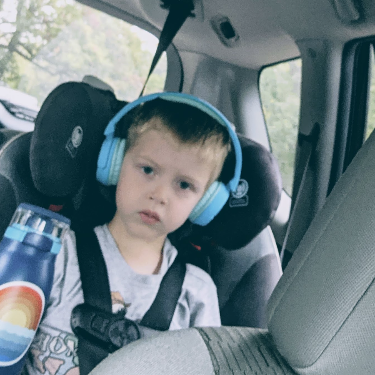
Carseat Questions
By Kris Gifford
Date Posted 10/14/2021
Momma, what is a jail? My five-year-old calls out this question from his carseat as we navigate through one of Maple Grove’s endless parking lots. As anyone who has ever interacted with a five year old can attest, there are regular moments when the questions they ask suspend time, rendering you outside of your body, looking in on the world as a visitor or a stranger. Children give us this gift of new eyes, and I am grateful.
Still, I often struggle during these times. The temptation is to always make the world more palatable and simple. In certain ways, this is necessary given that he is so small. But often, the palatable response to his questions functions more as a way to maintain my own naivete, my own wall against the suffering or pain that is a reality of our world, my own idea of what it means to “protect my child.” A few nights ago, he asked, “Do kids ever die?” and I immediately wanted to say, “No, that’s not something you have to worry about. Time for bed.” But he was worried about it, and I took him seriously. I answered, “Yes,” and let him cry for several minutes into his spider man pillow case. When his tiny tear-streaked face re-emerged, I stroked his hair, told him that he will always be loved, forever, and that he is completely and forever free and safe in love. He asked some more questions, and I tried to answer truthfully and wholeheartedly. He relaxed, his arms and legs melting into his soft comforter, and drifted off to sleep.
So today, when I hear, “Momma, what is a jail?” I let myself struggle into answering this question, allowing the struggle to show me what it wants to say about myself and our world. The first thing that becomes apparent is that another wave of my white privilege is breaking around me and should not be ignored.
Obviously, talk of a brother, uncle, cousin, father in prison isn’t happening in our living room or around our table. Our minds have never had to bend to the expectation that someone we love will be taken from us, from society, and locked behind bars. And this is because we are white, surrounded by white family, living in a white community. White supremacy has allowed mass incarceration to not be my problem. It has created the false belief that the people in prison deserve to be there and that my better morals and my better parenting is what protects my child from ever suffering such a fate--it couldn’t possibly have anything to do with racist structures in our community that I implicitly support. This mindset of scarcity has worked for a long time. I don’t have to think about jail at all. Except, right now I do. So I let my body feel that disturbingly cold water of white privilege that I always swim in, and I tumble through an answer.
“Well, people created places, called jails, where we lock some people up because we think that makes things safer…”
In my floundering, a second thing becomes more obvious than it ever has before. Prison, particularly with its roots in racism, is a terribly inhumane construction. No child anywhere should have to learn the meaning of the word either through family experience or like my child, just because it exists. I don’t tell my child about the conversion of slavery into a profit-driven prison industrial complex, that our so-called land of the free is the country with the highest incarceration rate and with the most prisoners in the entire world, that black children can be fed from school to lock-up, that as Michelle Alexander puts it, mass incarceration is “a stunningly comprehensive and well-disguised system of racialized social control that functions in a manner strikingly similar to Jim Crow” (The New Jim Crow, p. 4). I don’t tell him that his white skin will make it very unlikely that he will ever know what it feels like to sit in a cell.
I don’t tell him these things yet, but I leave room as best I can in my answer for these truths to have places to settle later. I stay open to the questions, and I let myself not know all the answers. I let myself be uncomfortable with the privileges and blindness whiteness has given me. I let myself see the world, all of its difficult realities, with new eyes. I feel the painful realizations that come with this new seeing. I don’t look away from the steel bars that surround minds and cage bodies. I trust that love is what makes us safe and free, and with the others who are already hard at work, I join in.
Kris Gifford lives, writes, mothers, and teaches in the western suburbs of Minneapolis. She is constantly rediscovering the divine in everyone and everything around her after being raised in a narrow version of nationalistic, white evangelicalism.